The View from the Hill 20th March 2022
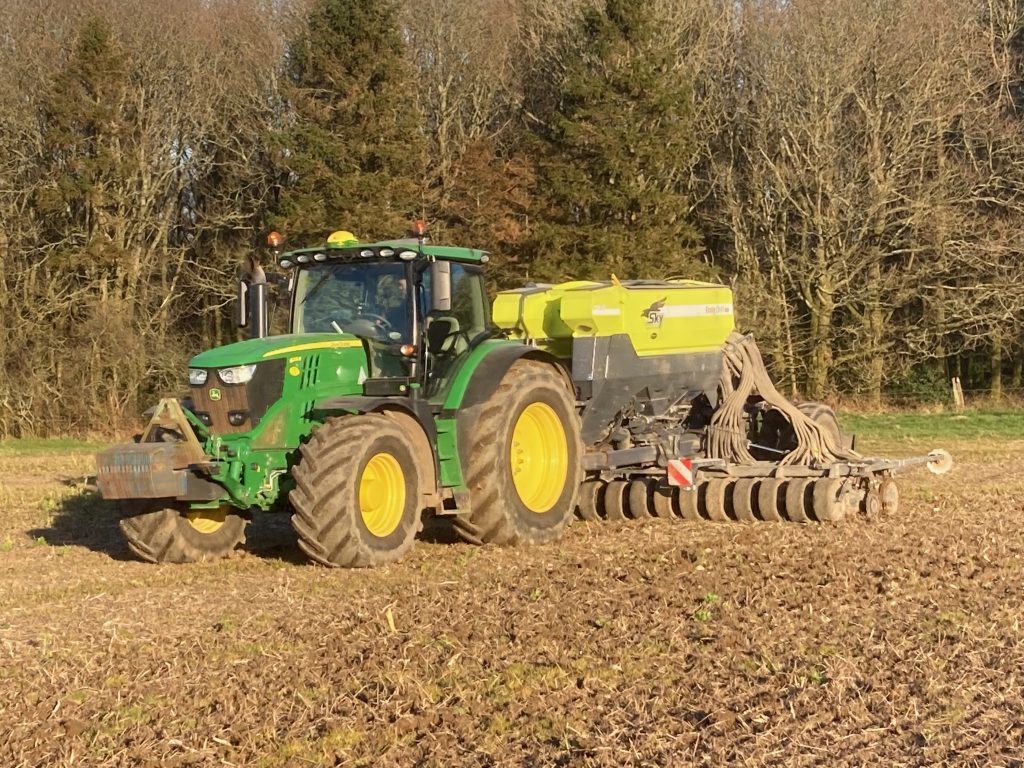
All we wanted was a few dry days and a bit of sunshine, and finally it arrived last week (21st March). Being farmers of course means that it is no time at all before we are starting to worry that it will never rain again, and it becomes a rush to get the beans planted, rolled and sprayed, so we can push on the with the spring barley, which is far more important. Direct drilling is a challenge at this end of the sowing season; wet soils are painfully slow to dry if you don’t move them first. Thank goodness we didn’t have any manure to spread this spring, which would only slow the process, and make horrible wheel marks in the seedbeds. I hope the Secretary of State is listening, he who seriously seems to believe (and announced on television last week) that we don’t need artificial fertilisers because there is enough manure and digestate in the country to sufficiently fertilise all of our crops. What planet is he living on? He is implying a) that we have been wasting fertiliser all these years because we never actually needed it, and b) we must have millions of tons of FYM hiding somewhere that we accidentally haven’t been using. The fact is that we already use 48 million tons of manures on our crops in the UK every year, and 1 million tons of nitrogen fertiliser. You would need 57 tons of manure to replace the nitrogen in one ton of manufactured fertiliser. To think it is possible to replace all manufactured fertiliser with manure is clearly ridiculous, we have nowhere near enough animals. (And we keep being told that animals are bad for the climate, but that’s a story for another day).
I must be an idiot to have ever taken seriously anything that George Eustice has said, I have tried to convince myself that public money for public goods will really make sense when we see what it means, that ELMS will eventually arrive just as BPS expires, with an administrative system that works first time, complete with a functioning mapping system, and that the disconnect between Farming Rules for Water and creating healthier soils will be mended. I generally try to be a ‘glass half full’ person, but when faced with such bare faced dishonesty and ignorance such as has been spewed out recently I find myself really struggling to remain calm.
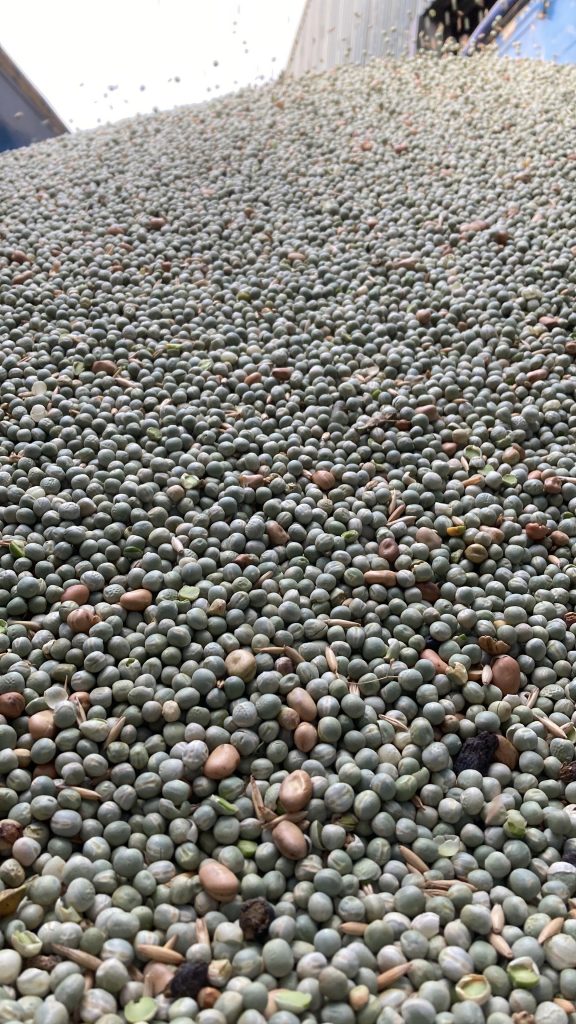
Seed cleaning update: As a consequence of our experiments with mixed crop plots last summer, we have had several odd seed mixtures sitting around in bags and piled in corners here and there. It couldn’t be put off any longer, we had to have a go at separating them. Starting with the easiest first, separating linseed from beans turned out to be very easy through our ancient Rutherford shake cleaner. The quantities were not huge, but should be enough to bulk up our cover crop seed stocks, which was the whole point of the exercise. 5 bags of linseed (approx 100kg) separated from around 3 tons of beans was quite straightforward. After that we had to fix up something a bit higher tech than the rickety old Rutherford, so we hired a bulk cleaner set from our local seed cleaners Evans and Pearce Ltd. This machine did a great job with the peas and oats mix, not the usual 85% purity one expects from purchased seed, but good enough for cover crops, along with a few stray beans, well who was going to clean the combine out between every 2 acre plot?
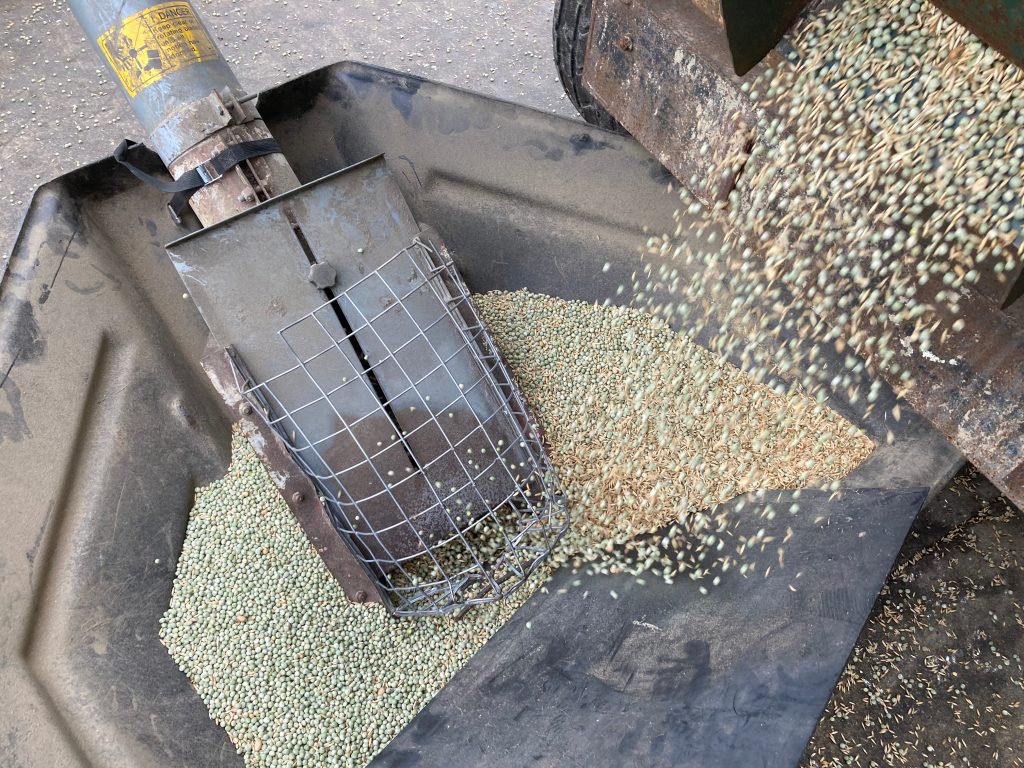
Vetch/phacelia worked well, resulting in a pretty clean sample of both, but vetch/oats was the biggest challenge, running it through several times, varying the speed of running through and playing with the auger screens, yielded reasonably clean samples though not as good as I would have liked. There’s quite a few split vetch seeds in the oats, and still too many oats in the vetch. If doing this again a return to the Rutherford and a search for some 3.5mm screens might be required.
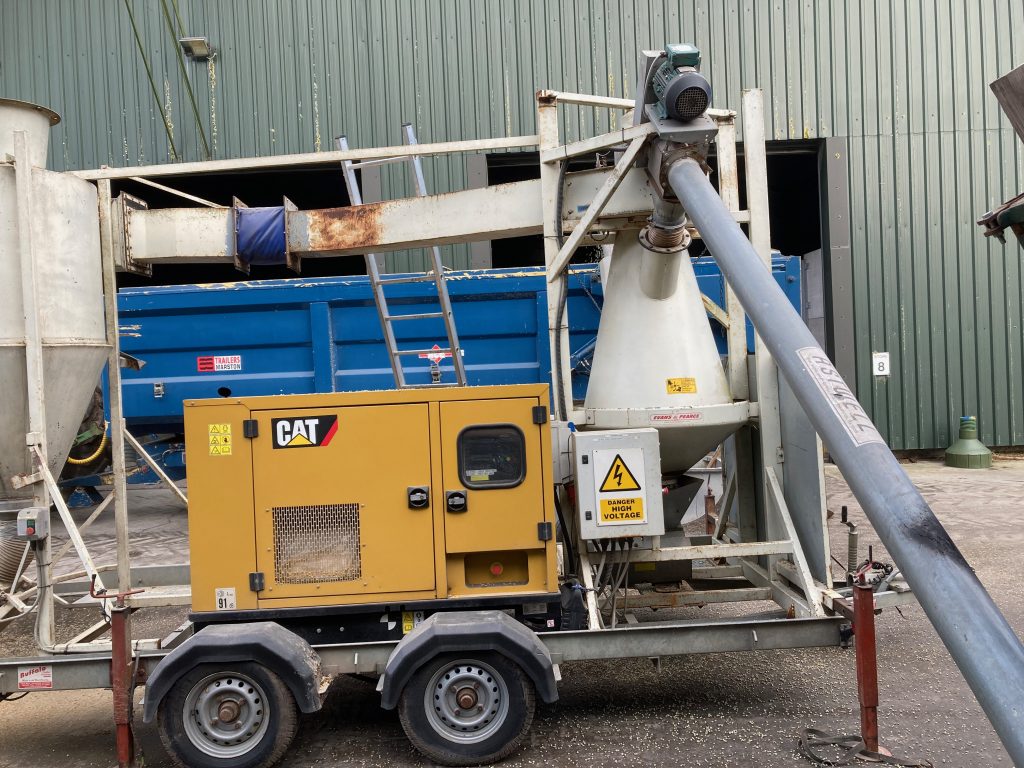
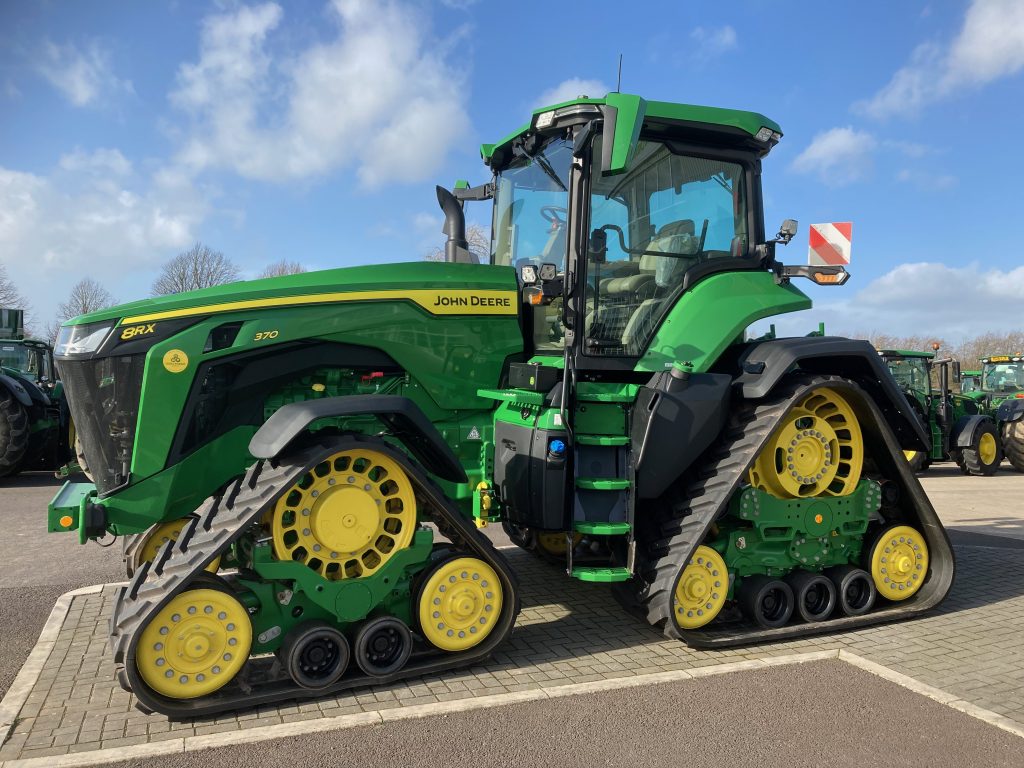
Our local John Deere dealer Smart Ag Services has been taken over by Hampshire based Hunt Forest Group during the last few months, now the vans have had a makeover, and the last vestige of Smart Agriculture sadly seems to have finally disappeared. Colin Smart set up the business after the demise of Milton Mills Engineers in 1998, and has set the standard for Dorset dealerships since then. A recent visit to the premises revealed this beauty (an 8RX, tracks all round) on the forecourt, a new take on the 3-400HP range of tractors, though how anyone might consider buying such fancy tinwork in current circumstances beats me. Rocketing input prices and yo-yoing grain prices leaves us with a very high risk of making bad decisions. Fertiliser is in the spotlight, not only because of price, but because of supply, how many will go short this year? Some well-resourced farmers are in the habit of buying their nitrogen requirement almost a year before they need it, and those who did so last year should be feeling very smug right now, prices having risen by a factor of four. But should they be using all that fertiliser this year, or should they save half of it for next year? We are often reminded that 50% of the nitrogen applied to a crop gives up to 80% of the yield, NIAB has many graphs demonstrating that the last bit of fert, which we have in the past often applied ‘just in case’, barely pays for itself in more years than when it does. So is this not a time for experimentation, to see what we can get away with and still grow a profitable crop? Headline yield is not what we need to pay the rent, it is the margin over costs that really matters, and right now we need to do our sums really carefully. On top of fertiliser woes, we have a huge headache over fuel price and availability, without fuel we can’t even spread fertiliser if we have any, and let’s be honest, something will grow even if it gets no fertiliser at all, but without fuel, we won’t be able to harvest what has grown, so I know which I consider the more important. Having said that, for red diesel to be costing more than DERV does at the local pumps once the 47p per litre difference in fuel duty has been taken into account, someone must be pulling a fast one.
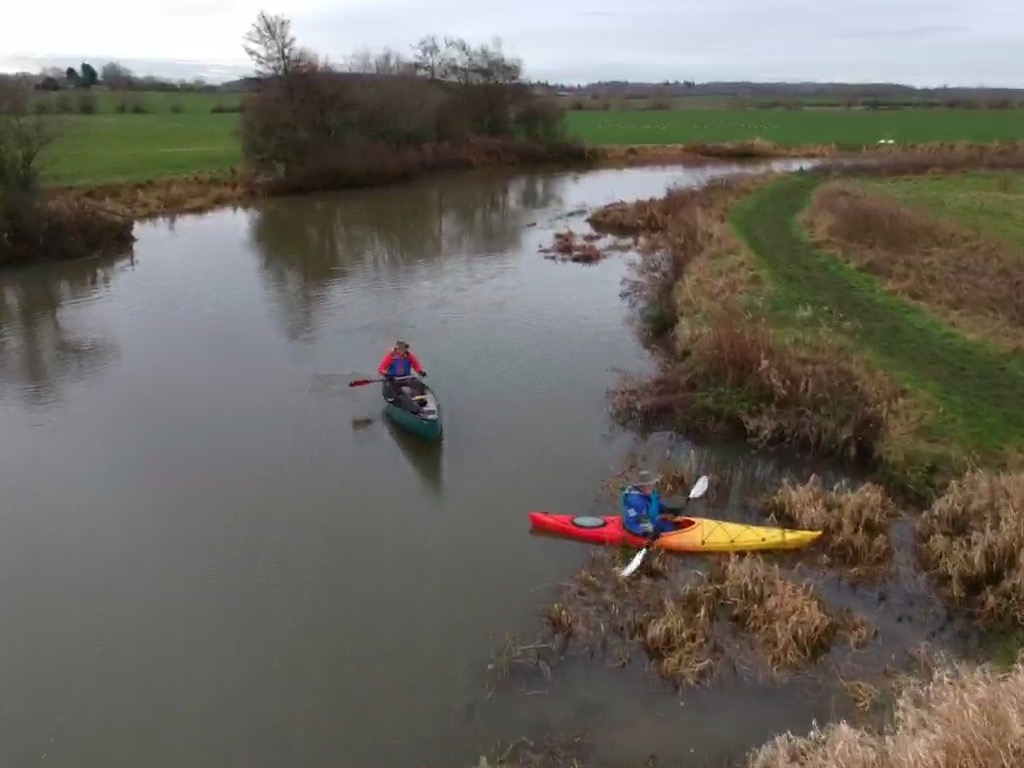
As a postscript to last month’s account of paddling on the Thames, which included a foray out into a flooded field of maize stalks: I had mistakenly believed that we had been in Oxfordshire and that the story wouldn’t come back and bite me on the bum. It turns out that we were in Wiltshire and the land in question is farmed by a regular reader of the farmers’ magazine where some of this guff also appears, who called me on the day the magazine hit doormats! Very relieved to have not been severely berated I feel it is only fair to put his side of the story. Crops have been grown next to the Thames in that region for many years, but it floods far more often than it used to. As the years have gone by, nearby in the catchment, Swindon has grown exponentially reducing the area over which the river can spread, not only that but there are many trees in the river which no longer get cleared out, reducing flow, consequently the land remains under water for longer periods than in the past. Also, the farmer tried his best to put the fields in question into arable reversion under his stewardship agreement, but for some inexplicable reason they were turned down. Surely this kind of sensitive land is exactly what should go into such schemes ?
His final point was that cover crops, if established after the maize has been harvested, could result in even more soil leaving the field, as the soil would not have the benefit of having ‘bedded in’ as it does over the previous months while the maize is growing. I acknowledge that he makes fair points, although would point out that a cover crop can be planted in maize much earlier in the season, leaving plenty of time for soil to stabilise, and make it far less likely that soil might wash away with flood water than with no cover crop at all.
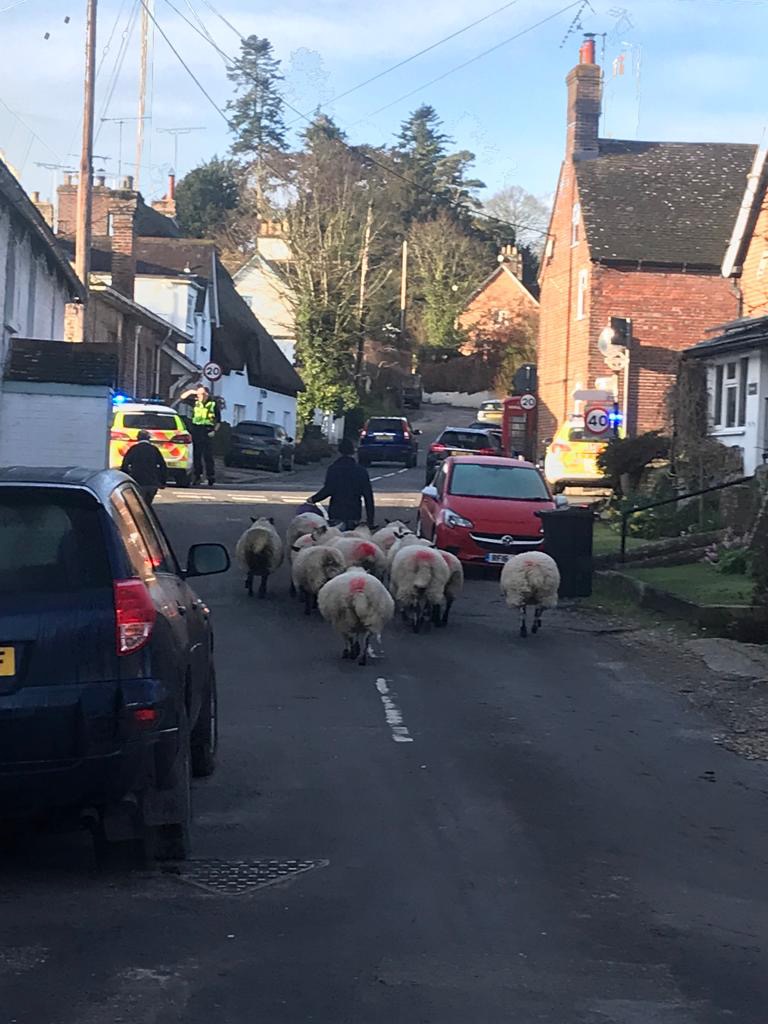
A small bunch of sheep went walkabout in the village the other morning, by the time we caught up with them a couple of police cars had joined the chase as well, careering into the village with sirens wailing and blue lights flashing. It was the usual problem of someone leaving a footpath gate open, so the sheep enjoyed a few hours of freedom, being caught on one resident’s hedgehog webcam and by a neighbour filming them wandering around a garden nibbling bits of this and that, before being escorted back to the field under the eye of the law. Luckily they were pet ones, and happily followed a bucket.

Farming has always been a gamble but the chips are much more expensive this year and the risk is so much higher.
Lack of support from our Government is almost enough to make one think that we are not valued at all by them.
Any Government is only two missed meals away from revolution, sadly it will be the poorer countries that have this revolution first – the ‘Arab Spring’ being a case in point a few years ago.
Over the last 60 years that I have been in Agriculture, Farming has always done better under a Labour government. With all that is going on with the stupid partygate shenanigans the future might be more rosy for the land under your stewardship.
PS Can you tell me where you are going to put the clockwork cuckoo , so that I do not have to wander about your glorious woods and coppices in golden sunshine hoping for a treat for my poor old worn out ears.
Jim
George Eustace is a prime example of the “promotion one level above capability” principle. He could just about cut it as a junior minister, having at least some farming experience, albeit not very successful. But Secretary of State material he most certainly ain’t, and the awful thing is I suspect he actually believes a lot of the twaddle he comes out with. It is very worrying both for farmers and for the rest of us who depend on them being able to function.
It used to be a three legged milk stool under CAP, but a pitch fork would suffice, two prongs, environment and food/farming. I agree with you George, that a one tined policy is a spear… and not much good for anything. Keep up the good work
Farmers in majority I suspect voted for Brexit (against the advice of their representatives) and thus this government. Are they going to admit they were wrong so to do? I doubt it.